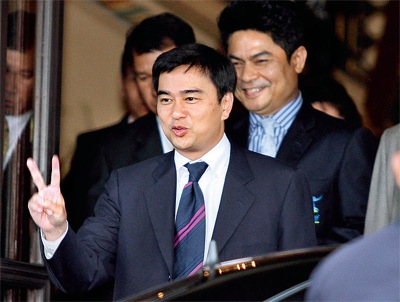
More on Thailand’s elections, which are set for July 3:
The Christian Science Monitor says the election is a “high-stakes contest in a shaky democracy”:
Observers say that the bitter rivalry between political groups, and the risk that neither would accept defeat, has increased the stakes.
The Bangkok Post points out that “A Pheu Thai victory does not guarantee a Pheu Thai government”:
Without a landslide victory, Pheu Thai has little chance of forming the next government even if it wins the July 3 election.
Prime Minister Abhisit Vejjajiva officially announced the election date and House dissolution via state television last night after a royal decree to dissolve the House of representatives was endorsed by His Majesty the King.
It was widely believed by several parties that the opposition Pheu Thai would win the election with the highest number of MP seats among contenders.
However, questions remain as to whether it can successfully form the next government.
Elsewhere, Bloomberg notes the risk for equities:
“The outlook for Thai equities will be a bit risky after the election because there will be more uncertainty in forming the coalition,” said Kiattisak Jenwipakul, head of research at SCB Securities Co., a unit of Siam Commercial Bank Pcl. “Domestic spending statistically jumps during the campaign because people are more upbeat and cash from politicians channels through the system.”
The Financial Times also has more on the economic implications of the coming election.
And finally, a Reuters “fact box” says some wonder whether an election will actually happen:
The election may not actually take place. Conspiracy theories abound that influential figures may be plotting to derail the poll by engineering judicial or military intervention. Some fear de facto power could return to Thaksin, who would seek to overhaul a power structure dominated by his political enemies. A Puea Thai government could scrap some of the previous government’s policies, initiate top-level purges within key institutions like the judiciary, police and military and perhaps seek an amnesty allowing Thaksin to return home and resume his political career without serving a two-year prison sentence for graft.
(All emphasis mine.)
(Image: Bangkok Post.)
